Summary
OpenPhone has established a strong reputation for themselves as a business phone system for startups and small businesses. But the cloud telephony market is becoming more diverse all the time. There are now OpenPhone competitors offering appealing options for businesses in need of cloud telephony software with a comprehensive selection of features.
To ensure your business communications are optimized, take a look at the top 12 OpenPhone competitors.
Table: Best OpenPhone competitors
| Software | Advantages | Disadvantages | Prices |
|---|---|---|---|
| 1. Ringover | Unlimited international calls, large integration selection available, advanced telephony features | May not be suitable for entrepreneurs, QuickTalk would be a better option | Ringover has three plans available which range in price from $21 to $54 per user/month |
| 2. CloudTalk | The service is available from any device with Internet | High international calling rates, onboarding is difficult and may require significant time | Plans start at $30 per user/month |
| 3. Vonage | Integrations with popular software like Salesforce are available | Prices are relatively high compared to other services, and the pricing structure is confusing | Depending on the number of users, plans begin at about $20 per user/month |
| 4. RingCentral | Omnichannel communications are provided | Prices are quite high, especially for what you get | Prices begin at $30 per user/month |
| 5. 3CX | You can create internal organization by creating groups | 3CX doesn't provide any actual phone service, just a SaaS with telephony features | Plans begin at $145 per year |
| 6. Mitel | Offers a great selection of hardware | Few telephony features are available | Price is on request only |
| 7. Dialpad | The software has a good user experience | Add-ons and other unexpected costs can drive up the bill | Dialpad has three plans, starting at $23 per user/month |
| 8. JustCall | The software is known to offer good customer support | A complicated and confusing pricing structure, including differing prices for calls to landlines vs. mobiles | There are three plans on offer, beginning at $20 per user/month |
| 9. Five9 | Various communication channels on offer | Analytics aren't complete enough to make a notable operational difference | Five9 has multiple plans available, with the least expensive beginning at $150 per month |
| 10. Ooma | Specialized for small businesses | Poor service leads to dropped or interrupted calls | Prices are on request only |
| 11. Nextiva | This brand offers a customer experience software in addition to VoIP | Complex pricing plans make it difficult to define your budget | Costs vary depending on how many users |
| 12. Zoom Phone | Meant to provide a solution for small businesses | Doesn't support more than a small volume of calls | Plans start at $10 per user/month |
What is OpenPhone?
OpenPhone is a VoIP business phone system meant to serve small businesses. One of its main value propositions is the ability to add a second phone number to an existing mobile phone. But it has grown from this initial offering to an all-in-one business phone system useful for entrepreneurs and small teams.
The OpenPhone softphone does have limits, consistent with its origins as a basic solution for small businesses. For example, very few features are included in its most basic plan–in fact, not much more than one phone number and calling and messaging domestically and to Canada. As for video conferencing and auto attendants, they're not available at all.
OpenPhone prices
OpenPhone has three plans available, with the third one just an enterprise option that is priced on request. There is a Starter plan at $19 per user/month, which has extremely minimal features available, like getting one additional phone number and only calling to the US and Canada. The Business plan is $33 per user/month, which includes an analytics dashboard, call recording, Hubspot and Salesforce integrations, call transfers, and more. Finally, there is an enterprise option which is priced on request only.
Why look for an alternative to OpenPhone?
You need a comprehensive solution
OpenPhone does have basic features on hand, but you may find yourself limited by the technology they have available. That's especially possible if you have subscribed to their most basic plan.
That's why it's important to consider other inbound and outbound contact center software, such as Ringover. If you need features like IVR, video conferencing, local numbers, integrations, click-to-call, call forwarding, and more, it would make more sense to opt for Ringover. Ringover was built to support businesses of all sizes, with a pricing scale ideal for growing businesses.

You need stellar technical support
If you're launching a new business application, the onboarding and training processes are key. They need to go well for the employees to fully integrate the software into their daily operations. If the onboarding is too complicated, too long, or simply too tedious, this can be an adoption barrier for the users. Unfortunately, OpenPhone has been known to have a long and complicated onboarding, which is especially difficult for smaller businesses who already have little time to waste.
That's why the top OpenPhone competitor Ringover wins out. Ringover has an intuitive interface that's so easy to set up, it can be done in a matter of minutes. And with your communications centralized in one spot, you'll be able to understand and optimize your virtual phone system at a glance.

You need affordable international calling
As previously mentioned, OpenPhone simply doesn't provide international calling in their monthly plans. Instead, you'll have to pay extra costs. And since the calls and texts will be charged depending on where your contact is located, the bill can add up quite quickly.
So if you already have a large international customer base or are currently developing one, opt for Ringover. Ringover includes unlimited calling to over 110 destinations in the monthly rates, so you won't have any unpleasant surprises at the end of the month–no matter how many minutes you log.
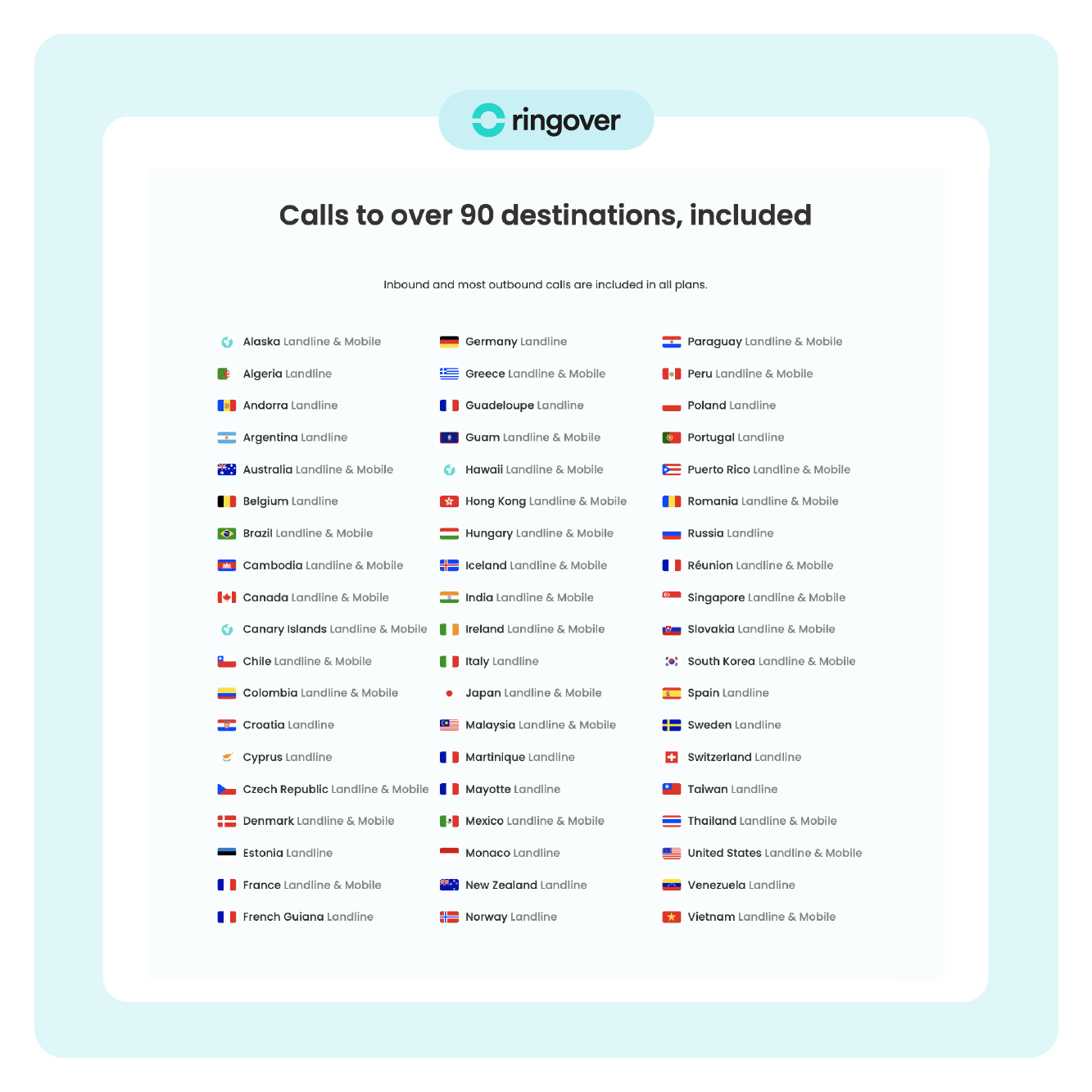
The 12 best OpenPhone alternatives for great business communication
Best alternative #1: Ringover
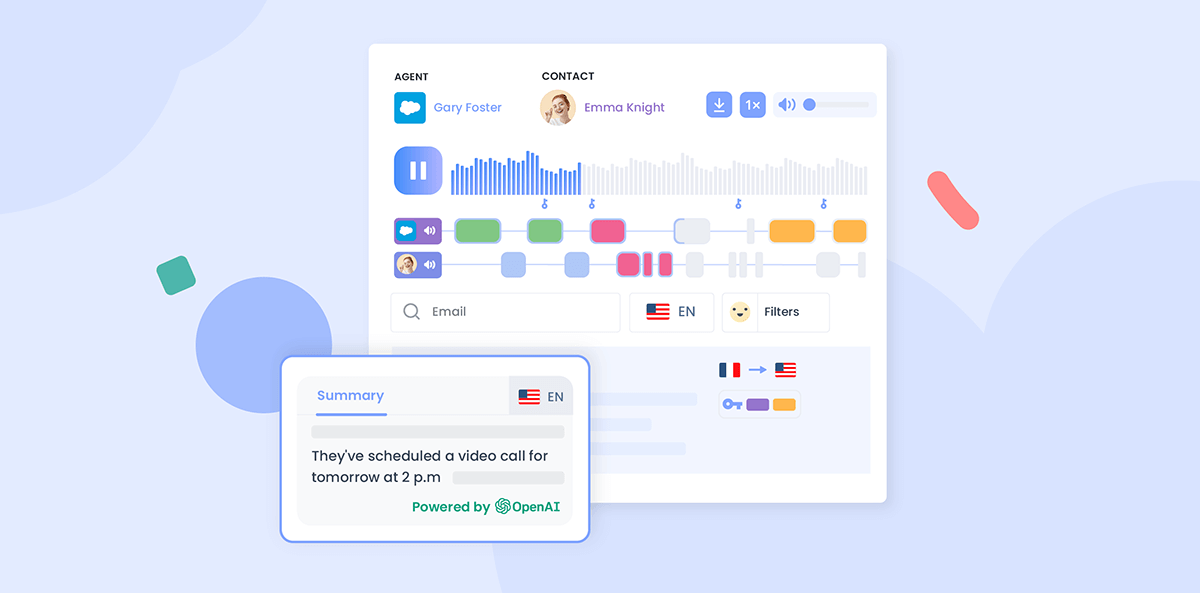
If you're looking for a cloud VoIP solution, turn to Ringover. This software is tailored to support businesses regardless of their size with three affordably priced plans. In fact, the fees start at just $21 per user/month, and top out at $54 per user/month for the Advanced plan.
With those accessible prices, your business will access the features your contact center, whether it's inbound, outbound, or both, needs to grow. This includes unlimited international calling, CRM integrations like Zendesk and Zoho, call monitoring and sales prospecting tools like power dialer and call campaigns.
And despite the wide range of possibilities offered by Ringover, the software can be installed and set up in just a matter of minutes. Onboarding and configuration are simple processes, though there is support available from our dedicated support team.
Key advantages of Ringover ➕
- Free 7-day trial
- Performance analysis dashboard
- Integrations with business tools
- Unlimited international calls
- Wide range of features
Ringover disadvantages ➖
- May not be suitable for entrepreneurs
Video: Discover Ringover
Alternative #2: CloudTalk

Having just come on the scene in 2018, CloudTalk has quickly developed a product that's consistent with other options on the market. However, the devil is in the details, and there are a few details which make all the difference. CloudTalk has a decent range of tools to support unified communications (UCaaS), such as automatic call distribution. Plus, there is a good selection of integrations on offer, with options like Pipedrive or even recruitment software such as Jobadder and Bullhorn.
There are a few notable drawbacks though, especially if you run an outbound contact center. Most importantly, outbound calls are metered, meaning you'll be charged by the minute. This is a big difference from options like Ringover, which offers unlimited calls folded into the monthly price.
CloudTalk advantages➕
- Plans allow you to scale as you need
CloudTalk disadvantages ➖
- Outbound calls add up to quite the expense
- Poor user experience results in difficult onboarding
- High costs to call internationally
Alternative #3: Vonage

With a strong focus on omnichannel contact center software, but also offers a more classic unified communications solution. So in order to determine what product and plan will be best for your business's current needs, you'll have to do significant research. One great example is that the business communications products have a low price, but it has an extremely limited number of features. Not even call recording is included!
Vonage advantages➕
- Well-established VoIP service
Vonage disadvantages ➖
- Overwhelming choice of options
- Affordable plans don't offer a good value because of limited features
Alternative #4: RingCentral

This solution is strongly focused on UCaaS, which provides a wide selection of features like text messaging, video calls, IVR, internet fax, and more. These days, they also offer an AI tool which uses conversation intelligence to support sales enablement. Similarly to Empower by Ringover, the AI tool helps sales teams improve their sales techniques and sales prospecting.
Given the complexity of the product on offer, RingCentral's plans are more expensive than RingCentral competitors. In the basic plan, international calling is not included, and adding international numbers is an add-on cost. And more importantly, the plan doesn't even include video conferencing.
RingCentral advantages➕
- UCaaS tools to support external and internal communication
RingCentral disadvantages ➖
- Plans aren't a good value for the money
- Poor customer support
- No unlimited calling to international destinations
Alternative #5: 3CX
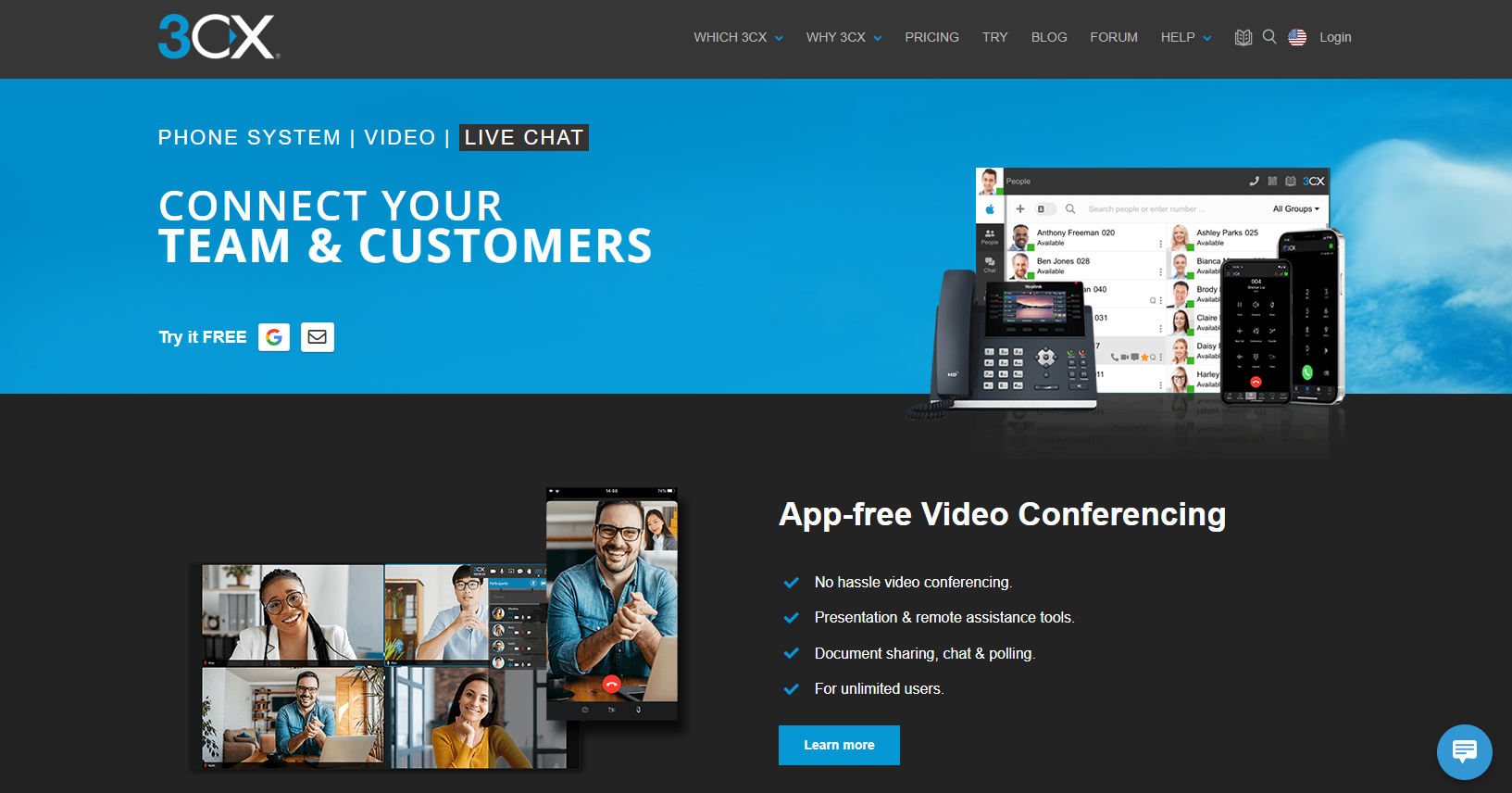
Founded in Cyprus 10 years ago, 3CX is a well-established provider of IP telephony software that provides businesses with PBX, video conferencing, live chat, and other tools for call centers.
However, it does not provide telephone service. To make phone calls and send text messages, you'll need to sign a contract with another business that provides it. The same thing goes for acquiring virtual phone numbers–in general, 3CX is less flexible and easily scalable than OpenPhone alternatives such as Ringover. Given that pricing begins at $135 per year, 3CX is not as good a value as other services on the market.
3CX advantages➕
- A free trial is available
3CX disadvantages ➖
- No telephone service provided
- Prices are high following the free trial
- Configuring integrations may take advanced technical knowledge
- Only basic telephony features are included
Alternative #6: Mitel
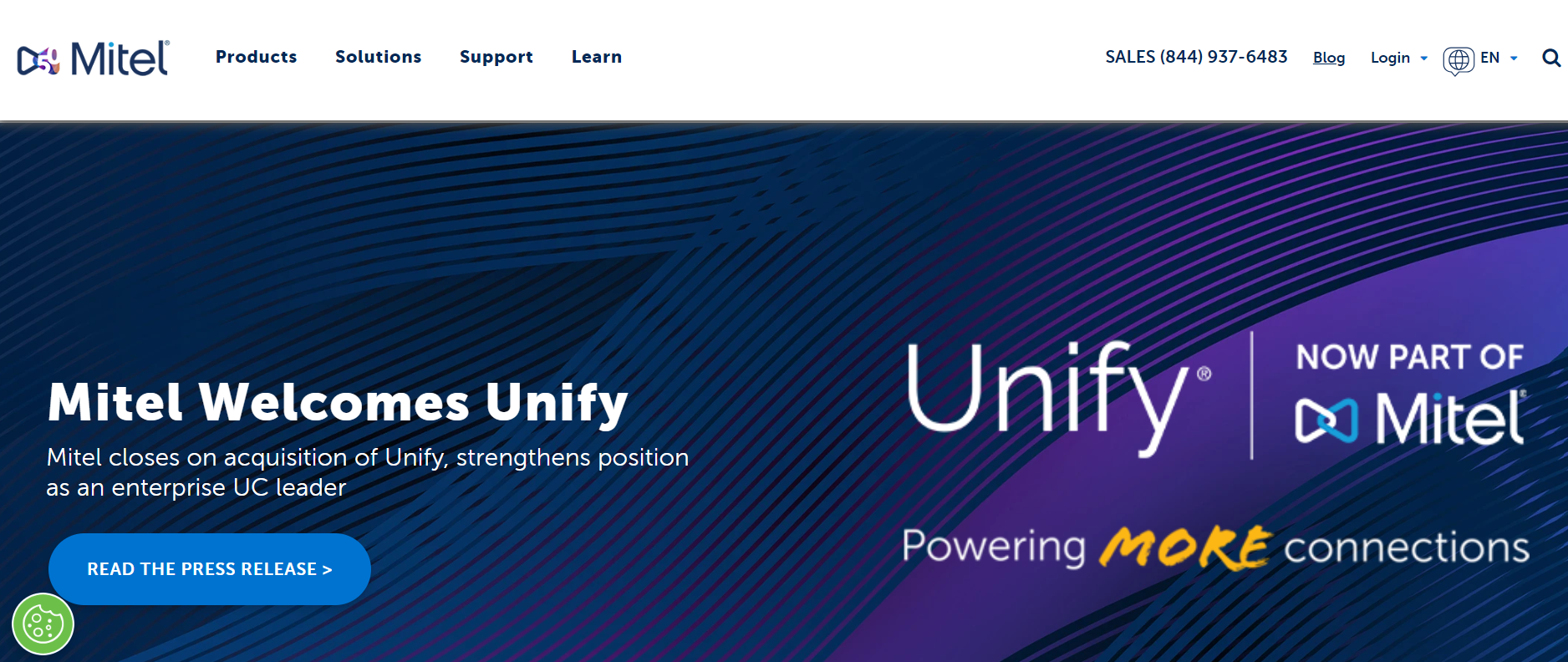
Mitel is an old hand in the business communications industry, having been founded in the 1970s. Of course, it was originally specialized in landlines and other telecommunications hardware, but has now expanded to offer digital technology like WebRTC and VoIP.
Now, they have comprehensive business phone systems available, and even AI virtual agents and various collaboration tools.
Mitel advantages➕
- Integrations possible with third-party applications
Mitel disadvantages ➖
- Choosing between plans and products can be confusing
- Basic plans are lacking in essential features
- Pricing can be unclear
Alternative #7: Dialpad

Initially, Dialpad was focused on enterprise communications, but now has turned to developing AI technologies into their products. Beyond providing foundational tools like audio calls, texting, video calling, transcriptions and more, there's also tools for customer and sales intelligence and collaboration.
In fact, there are functionalities like sentiment analysis so users have deep insight into how to better serve customers and prospects.
Dialpad advantages➕
- Free trial for a limited time
Dialpad disadvantages ➖
- Users frequently experience issues with call quality
- Pricing is high compared to other options
- Support has fallen through for customers
Alternative #8: JustCall
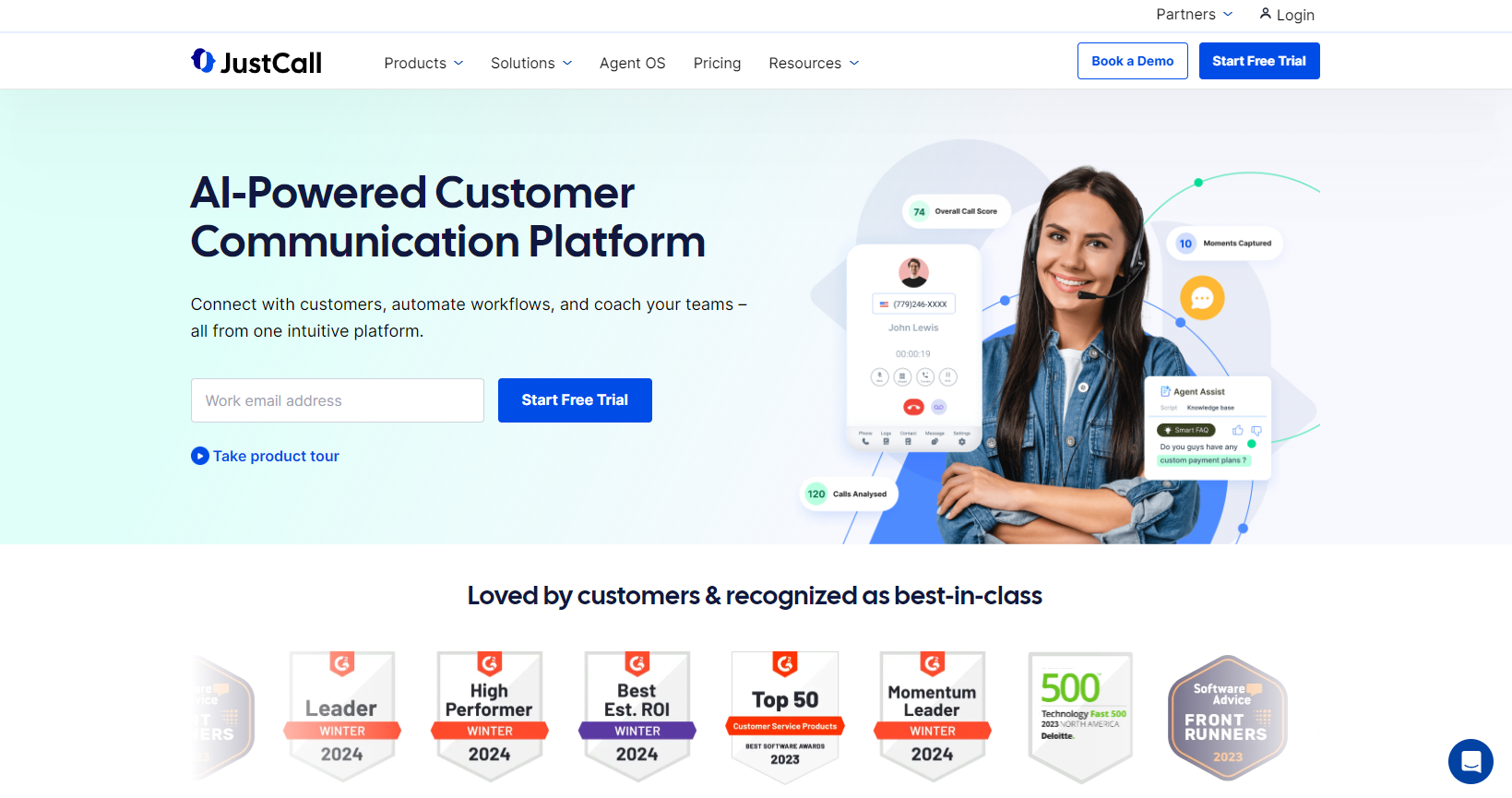
A relatively recent addition to the VoIP industry, JustCall was just founded in 2016. With many features on offer, JustCall is meant to serve both small and medium businesses, especially those which maintain contact centers.
A couple of things to note about JustCall is that they only offer a Salesforce integration in their most expensive plan. Additionally, their integration library is only accessible on purchase of the second-most expensive plan. Finally, before clicking “buy,” take a look at the user limits for plans, as there are minimum user caps.
JustCall advantages➕
- Large integration library
JustCall disadvantages ➖
- Outbound calls are limited
- Difficult-to-use interface
- Plans aren't a good value for their cost
Alternative #9: Five9

If your company's focus is on customer service, Five9 is a company which might serve your needs. They are a contact center as a service (CCaaS), and also offer certain AI tools like virtual agents.
However, their lowest pricing tiers present potential customers with a tough choice, as you can either opt for digital communication channels like chat, email, text messages, or a second option which only includes phone calls. Take a close look at their plan offerings, as certain features normally considered standard with all plans, like the analytics dashboard, is only included in their most expensive option.
Five9 advantages➕
- Omnichannel communications
Five9 disadvantages ➖
- Plans are tricky and not a good value for the money
- Persistent service issues
- Analytics are poor quality and expensive
Alternative #10: Ooma

Ooma was originally founded as a VoIP service for individuals in 2004, which has since evolved to offer professional communications features called Ooma Office. The service is really best for small businesses, as its selection of UCaaS features isn't as expansive as other OpenPhone competitors.
Ooma advantages➕
- Compatible with certain hardware
Ooma disadvantages ➖
- Poor call quality
- Not available in all regions
- Limited integrations
- Complex pricing structure, difficult to control costs
Alternative #11: Nextiva

Nextiva is a large IP telephony service founded in 2006 which helps businesses to consolidate their communications into one centralized location. There are three plans available for their VoIP service, the prices of which change depending on how many users are active.
Their features selection is relatively basic, so much so that their pricing can seem a bit expensive for what you receive. One thing that definitely needs to be looked into is their selection of integrations, as there is not much information provided online.
Nextiva advantages➕
- They offer a customer experience platform in addition to their phone service
Nextiva disadvantages ➖
- Few integrations
- Confusing pricing plans
- Fees are quite high
Alternative #12: Zoom Phone
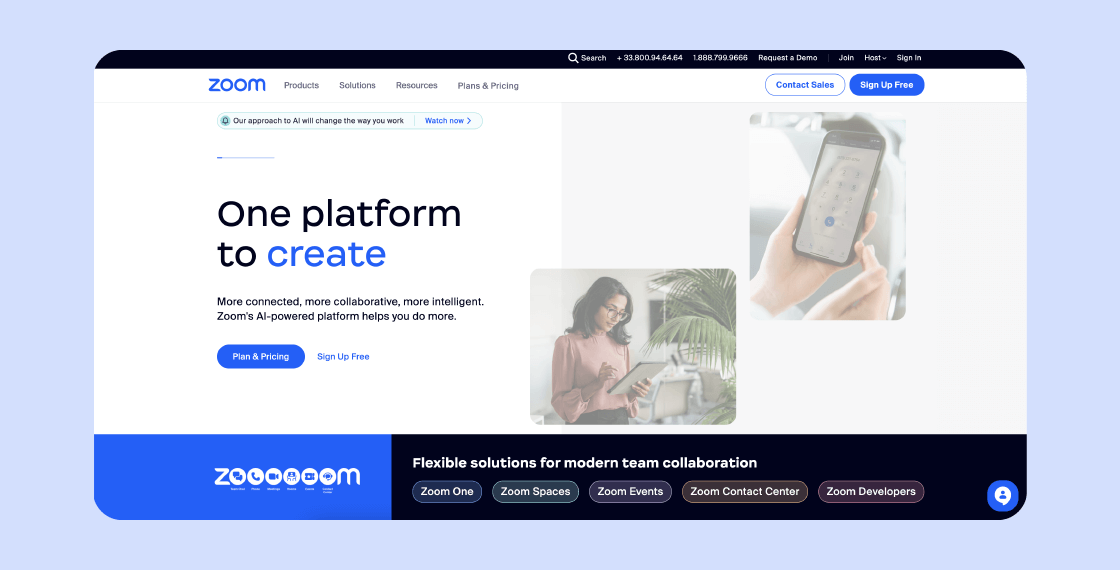
Zoom is a well-established software following the pandemic, but their phone service is less well-known. There's a good reason for that, as the IP service has few features available. However, it could be a decent option if you use the video call service frequently. Just be sure to check the pricing structure before you commit to a contract. Any kind of outbound calling is charged per minute, so if you're prospecting for sales or recruiting.
Zoom Phone advantages➕
- Easy integration with Zoom video conferencing
Zoom Phone disadvantages ➖
- Metered outbound calling
- No international numbers or texting
- Few telephony features
What's the best OpenPhone alternative?
Ringover is by far the best OpenPhone competitor because it has an ideal combination of call quality, telephony features, flexibility, and clear and affordable pricing. If you are in need of a scalable business phone system, Ringover is the answer–and you'll even get unlimited calling to over 110 destinations.
Curious to learn how Ringover can transform the daily operations of your business? Begin your free trial today!
Bibliography
- https://www.five9.com/products/pricing
- https://www.openphone.com/pricing
- https://www.vonage.com/unified-communications/pricing/
- https://www.trustradius.com/products/openphone/reviews
- https://www.mitel.com/


